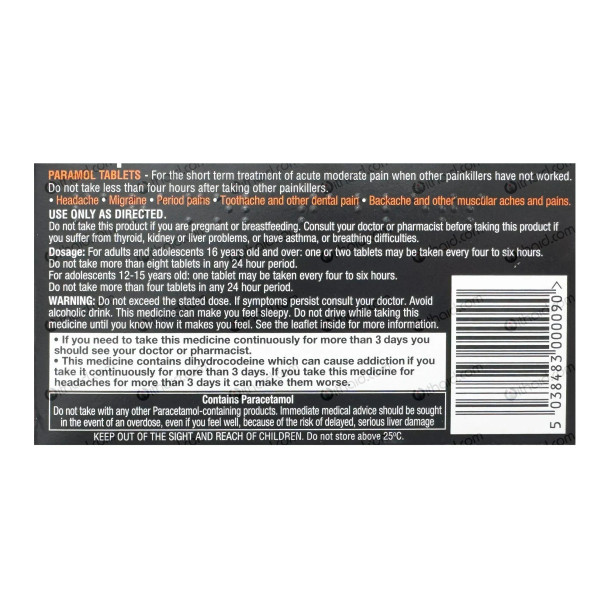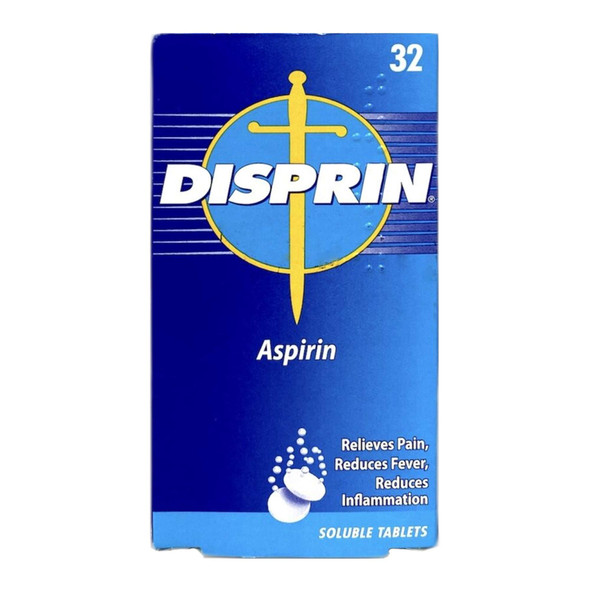What is in Paramol?
The active ingredients of Paramol tablets are paracetamol 500mg and dihydrocodeine 7.46mg, which work together to ease pains that can’t be relieved using other painkillers. Paracetamol is an everyday painkiller that can also be used to reduce high temperature and fever. Dihydrocodeine is a powerful analgesic, which can be used alongside other painkillers to relieve moderate pains.
Do Paramol tablets make you sleepy?
Paramol tablets typically contain a combination of paracetamol and codeine. The codeine is the ingredient most likely responsible for making you feel sleepy.
Codeine is an opioid pain reliever, and opioids can have sedative effects because they work on the central nervous system, slowing down brain activity. This can lead to feelings of drowsiness or fatigue. Paracetamol, on the other hand, is a pain reliever and doesn't usually cause drowsiness on its own, but it can enhance the effects of codeine.
So, the sleepiness you're experiencing is likely due to the codeine in the tablets. It's important to be cautious with medications that contain opioids like codeine, as they can affect your alertness and coordination. Which is why Paramol is usually not recommended for use whilst driving or using machinery, or for pregnant/breastfeeding women.
Can you take Paramol tablets with ibuprofen?
Yes, you can generally take ibuprofen alongside Paramol, which contains paracetamol and codeine, but there are some important considerations to keep in mind. Ibuprofen and the ingredients in Paramol work in different ways to relieve pain. While ibuprofen is a nonsteroidal anti-inflammatory drug (NSAID), paracetamol in Paramol is a pain reliever, and codeine is an opioid. Because they target pain through different mechanisms, combining the two can help provide more comprehensive pain relief.
However, it's essential to be cautious about the doses you take. Ibuprofen is typically taken in doses of 200–400 mg every 4–6 hours, while paracetamol should be taken in 500–1000 mg doses, with a maximum of 4000 mg per day. Taking both medications together can easily lead to an accidental overdose if you're not careful about the timing and dosage.
Another concern is the potential for increased side effects when combining these medications. While ibuprofen can irritate the stomach or cause kidney issues if used excessively, codeine has sedative effects that can lead to drowsiness and other opioid-related side effects, such as constipation. Therefore, it's crucial not to use both medications for long periods without checking with a healthcare professional.
To be on the safe side, it's always a good idea to consult with a doctor or pharmacist before combining ibuprofen with Paramol, especially if you're managing ongoing pain or have any underlying health conditions. They can help ensure that it's appropriate and safe for your situation.
Can you take Naproxen with Paramol?
Taking Naproxen with Paramol is generally not recommended without guidance from a healthcare provider. Naproxen is another type of nonsteroidal anti-inflammatory drug (NSAID), and when combined with Paramol, which contains paracetamol and codeine, there could be an increased risk of side effects, particularly concerning your stomach and kidneys. NSAIDs like Naproxen can irritate the stomach lining, potentially leading to ulcers or gastrointestinal bleeding, especially when taken in combination with other medications or over a long period.
On top of that, codeine in Paramol can cause drowsiness and constipation, and the combination of multiple medications that affect different systems of the body may increase the risk of these side effects. While paracetamol itself is generally well tolerated and doesn’t interfere with Naproxen, the combination of Naproxen and codeine may require extra caution due to their different effects on the body.
Because both Naproxen and Paramol can affect different aspects of your health, it’s important to speak to a healthcare professional before combining them. They can help determine if this combination is safe for your particular health needs and circumstances
Can you drink alcohol with Paramol?
It’s generally not recommended to drink alcohol while taking Paramol. The main concern comes from the combination of codeine, an opioid, and alcohol, as both substances can depress the central nervous system. This means they both slow down brain activity, which can lead to increased drowsiness, dizziness, and impair your ability to think or react quickly. In some cases, the interaction could even be dangerous, increasing the risk of breathing problems or an overdose.
While paracetamol, the other ingredient in Paramol, doesn't directly interact with alcohol in the same way, it's still important to be cautious. Drinking alcohol can put extra strain on your liver, especially since both alcohol and paracetamol are processed by the liver. Over time, this could lead to liver damage or other complications, particularly if you're drinking heavily or taking the medication frequently.
If you're considering drinking alcohol while taking Paramol, it’s a good idea to check with a healthcare professional to ensure it's safe for you, especially if you're using the medication for an extended period. It’s always better to err on the side of caution when combining substances that affect your central nervous system or liver.



































